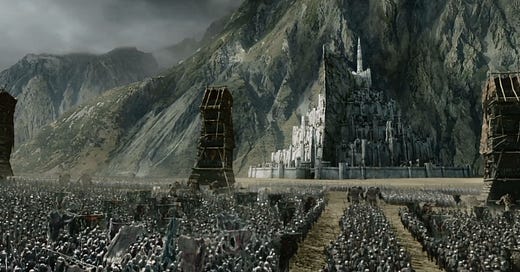A Clash of Civilizations
It is time to consider whether America is still one country under a common civilization or not. At this point, I'm prepared to argue it isn't.
My thoughts tend to run a little dark these days. I know that – but we need to go into dark places sometime to find the light.
I’ve really been struggling with why it seems that for all our trying, nothing seems to work. I think if any other president had the same first months as President Trump has had, his golden domed, spray tanned visage would be plastered all over every magazine and publication and Vogue would be begging our supermodel FLOTUS to do more covers.
But none of this is happening, quite the opposite.
So, here’s where I am with a possible reason why it isn’t happening.
The United States’ constitutional system, a marvel of deliberative governance, was designed to mitigate, adjudicate, and resolve conflicts through reasoned discourse and compromise. Yet, it increasingly appears paralyzed, unable to address the deepening divisions that threaten the nation’s fabric. The root of this dysfunction lies not in the system’s mechanics but in the nature of the conflicts it was meant to manage. George Washington, in his 1796 Farewell Address, warned of the dangers of “factions” whose rivalries could undermine the republic. Today, however, we face something far more profound than partisan squabbles: a clash between two irreconcilable civilizations, each defined by fundamentally opposed principles, values, and worldviews. This civilizational war, rooted in a battle between truth and anti-truth, cannot be resolved through deliberation. It demands total victory or total defeat.
Washington’s factions were groups united by differing interests but bound by a shared commitment to the republic’s survival. Political parties, as we know them, were the modern embodiment of this idea, channeling disagreements into a structured democratic process. But the divisions we face today transcend policy disputes or ideological differences. They reflect a schism between two civilizations that share no common ground. One civilization anchors itself in truth - objective reality, reason, and universal principles grounded in history and human nature. The other operates in a realm of anti-truth, where narratives are constructed from partial truths, stripped of context, and weaponized to advance power. This anti-truth civilization rejects shared moral frameworks, dismisses evidence that contradicts its dogma, and views dissent as an existential threat.
When one side believes America is the hope of the world and the other sees it as the root of all evil, when one recognizes the positive contributions of Western Civilization and the other demands its destruction, when one sees no advantage or disadvantage in race and the other defines everything through the lens of race, there is no room for middle ground. We may look alike, share the same skin colors, eat at the same restaurants, drive the same highways, and cheer the same sports teams, but we could not be more different if we were two distinct species. Our shared spaces mask a profound spiritual and intellectual divide.
The constitutional system was built for a society that, despite its differences, agreed on foundational truths: the value of individual liberty, the rule of law, and the necessity of civic virtue. These shared premises allowed deliberation to function, as factions could negotiate within a common moral and intellectual universe. Today, however, one civilization sees these principles as tools of oppression, while the other views their erosion as a betrayal of the nation’s soul. Issues like free speech, justice, or the nature of reality itself are no longer subjects for debate but battlegrounds in a zero-sum struggle. Where one side seeks open inquiry, the other demands conformity to its narrative, often cloaked in moral absolutism.
This clash is not survivable through compromise, for compromise requires mutual respect and a shared reality. The civilization of anti-truth, by its nature, cannot coexist with a civilization rooted in truth, as it thrives on distortion and control. The constitutional system, designed to referee disputes among reasonable actors, buckles under the weight of this existential conflict. Deliberation becomes futile when one side rejects the very premises of dialogue.
The only resolution is total victory or total defeat. History shows that civilizational conflicts - whether between Athens and Sparta or Rome and Carthage - end when one side’s worldview prevails unequivocally. For the civilization of truth to triumph, it must reclaim the institutions of culture, education, and governance, unapologetically defending reason and liberty. The alternative is a descent into a fractured, authoritarian dystopia where anti-truth reigns. The constitutional system’s genius lies in its resilience, but it cannot endure a war it was never designed to fight.
Long ago, I asserted that there will be no innocent bystanders in this conflict, that we will either choose a side or have it chosen for us. I still believe that.
These days, I am beginning to understand what Leonidas and his 300 felt when they lined up against Xerxes at the Hot Gates.





I've been feeling this too. Some years ago (I think it was on the eve of the 2016 presidential election) I wrote a post on how--even though we seem to be fractured--we all want the same things: safe streets, good schools, less crime, etc. We just disagree on how to get there. These days, it feels like we actually DON'T all want the same things.
I get your thoughts. I get your feelings. Everything is freaking overwhelming. How can it not be? Get ready for whatever comes and it can be anything. I see a divorce coming. There is definitely two way different sides. I don’t want anything to do with the other side either.